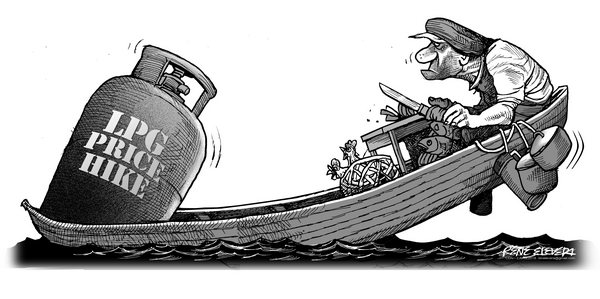
Consumers across the country are starting to feel the pinch of rising prices following successive surges in petroleum products.
Liquefied petroleum gas will be more expensive, making small entrepreneurs like Manolita Enerlan complain.
The price hikes are a sign for everyone to be more thrifty.
As Enerlan, a food vendor has experienced, the prices of meat and vegetables have also skyrocketed.
It is time for thriftiness or even for frugality.
But we do not know how much longer people can endure the state of affairs.
With the drop in the value of the peso, our currency has lost much purchasing power in the world market.
With ever more expensive commodities, our currency is likewise losing purchasing power in the global market.
On television, agents of the Department of Trade and Industry are playing to the gallery, visiting supermarkets to show that they are closely monitoring businesses to ensure none are profiteering.
What measures can the government take against inflation?
The tax reform law does not seem to have a safeguard against businesses raising the prices of goods and services on account of knowing that with less in taxes, those who earn now have more disposable income.
Do businesses, especially big businesses have a heart?
Will a morally grounded call for self-regulation of prices on the part of traders float?
We make such a call. It is after all those who are in a relatively better economic situation who benefit from tax reforms and the costlier commodities.
Much of the middle class and minimum wage earners can only do so much in terms of being wise spenders.
Business restraint could go a long way towards averting runaway inflation and the pandemic of despair and social unrest that the hardly affordable could set off as soon as people would realize that what they earn would be barely enough for their daily needs.